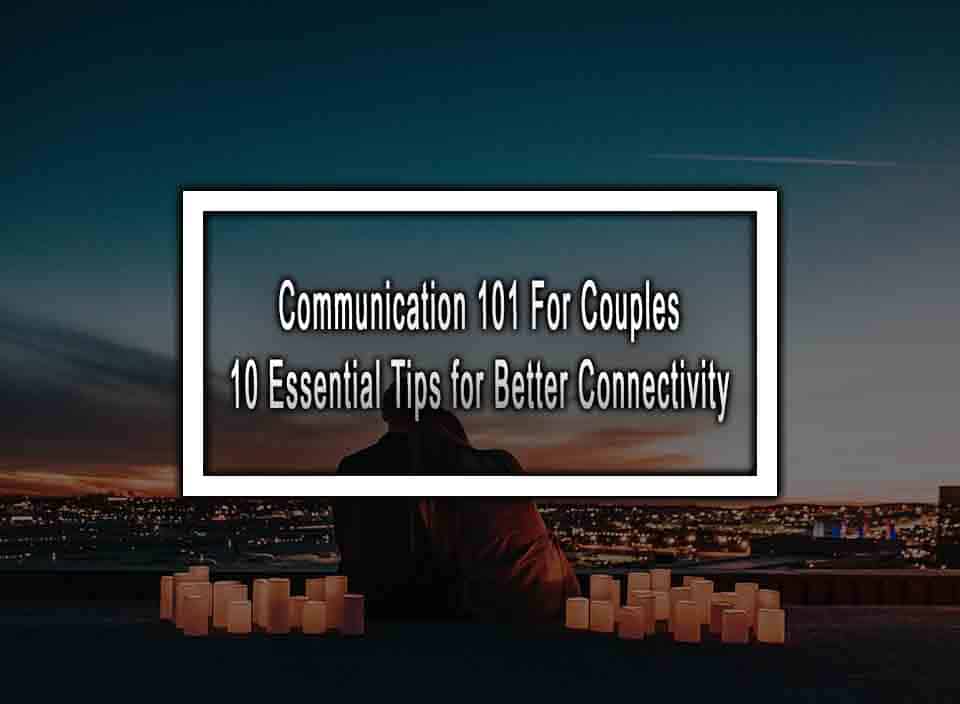Table of Contents
ToggleCommunication 101 for Couples: Mastering the Art of Relationship Connectivity
Love is great, but let’s be honest—sometimes communication can be a real struggle for couples. Whether you’re starting a new relationship or have been together for years, mastering the art of effective communication is vital for a healthy and thriving partnership. No worries, though! We’ve got you covered with these 10 essential tips that will take your communication skills from ordinary to extraordinary. Say goodbye to misunderstandings and hello to better connectivity in your relationship!
1. Start with Active Listening
To establish a strong foundation for communication, active listening is key. Show genuine interest in your partner’s words, reflect on what they say, and respond thoughtfully. This demonstrates that you value their thoughts and feelings.
2. Choose the Right Timing
Timing is everything! Avoid discussing sensitive or important topics when both of you are stressed or busy. Find a quiet and comfortable environment where you can focus solely on each other.
3. Use “I” Statements
Practice using “I” statements instead of “you” statements to express your thoughts or concerns. This helps avoid sounding accusatory and encourages a more open and cooperative conversation.
4. Keep Body Language in Check
Non-verbal cues often communicate more than words themselves. Maintain eye contact, stand or sit in an open and relaxed posture, and nod occasionally to show understanding and attention.
5. Maintain Respectful Communication
Respect is the cornerstone of effective communication. Treat your partner’s opinions and emotions with care, even when you disagree. Avoid interrupting, name-calling, or belittling, as these actions are harmful to the relationship.
6. Practice Empathy and Understanding
Embrace empathy in your communication style. Try to genuinely understand your partner’s point of view, even if you disagree. Empathy fosters trust, strengthens emotional bonds, and helps resolve conflicts smoothly.
7. Be Mindful of Tone and Voice
The tone and voice we use can significantly impact the meaning of our words. Aim for a calm and gentle tone, even during heated discussions. Avoid yelling, sarcasm, or passive-aggressive behavior that may escalate tensions.
8. Embrace Regular Check-Ins
Make it a habit to frequently check in with each other to maintain open lines of communication. These check-ins provide an opportunity to discuss any emerging issues, share feelings, and ensure that you’re both on the same page.
9. Resolve Conflicts Constructively
Conflict is a natural part of every relationship. Instead of avoiding conflicts, approach them constructively. Use “I” statements, actively listen, and prioritize finding a solution rather than blaming each other.
10. Seek Professional Help, If Needed
If communication problems persist and impact your relationship’s overall well-being, don’t hesitate to seek professional help. Couples therapy or counseling can provide guidance, tools, and techniques to strengthen your communication skills further.
Conclusion
Congratulations on completing Communication 101 for Couples! By now, you’re equipped with essential tips to revolutionize your communication style and bring harmony to your relationship. Remember, effective communication requires practice and effort from both partners. So gather your loved one, start implementing these tips, and enjoy the difference it will make in your beautiful journey together. Cheers to better connectivity and endless conversations!
Remember, effective communication is the key to a thriving relationship. So, why wait? Embrace these tips and watch your love blossom with every meaningful conversation.
Communication 101 For Couples FAQ
Here are the most common questions about Communication 101 for couples.
1. What are some common communication barriers in a relationship?
Some common communication barriers include a lack of active listening, interrupting, defensive responses, using negative language, making assumptions, and avoiding difficult topics.
2. What should we do when we have a disagreement?
When facing a disagreement, it’s important to stay calm and listen to each other’s perspectives. Avoid blaming or getting defensive. Instead, try to find a compromise or solution that meets both partners’ needs.
3. How can we avoid misunderstandings?
To avoid misunderstandings, be clear and specific in your communication. Repeat back what you think you heard to ensure understanding. When in doubt, ask for clarification instead of assuming.
4. What should we do if one partner is not willing to work on communication?
It can be challenging if one partner is not willing to work on communication. In this situation, it may be helpful to seek professional help from a couples therapist who can guide the couple towards better communication habits.
5. Are there any communication tools or exercises that can help us as a couple?
Yes, there are several communication tools and exercises that can help couples improve their communication skills. Examples include active listening exercises, using assertive communication techniques, practicing empathy, and trying out conflict resolution strategies.












